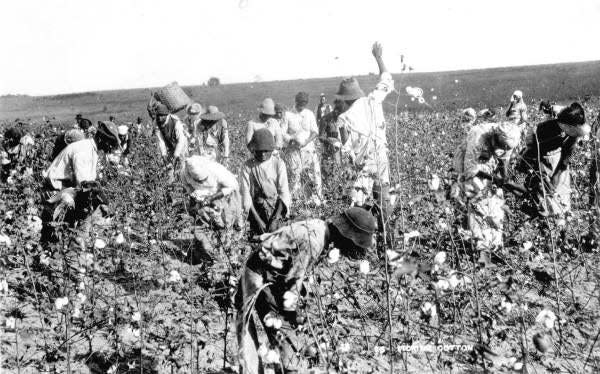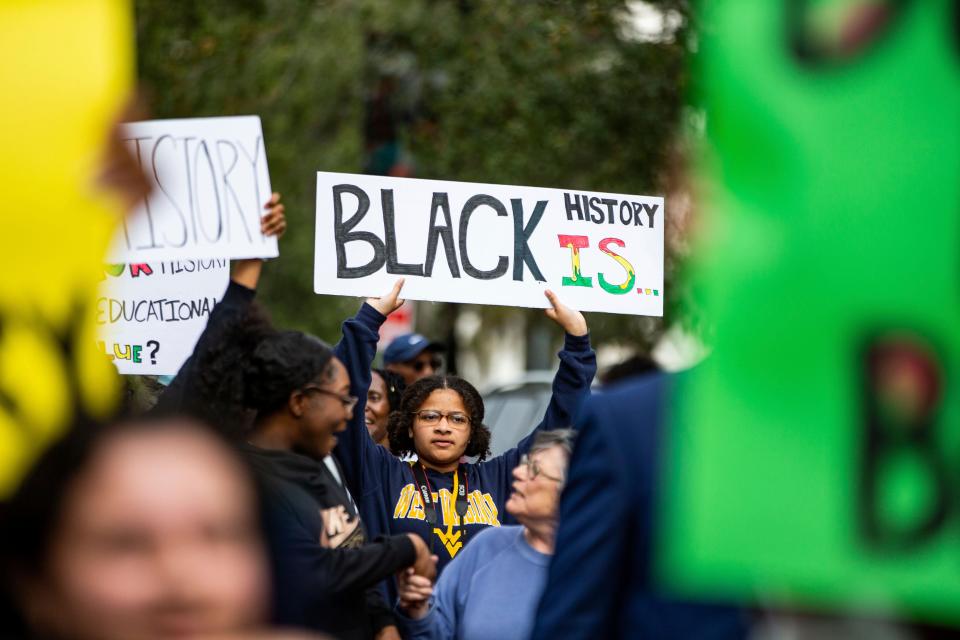Cruelty of slavery shown in 1853 Florida high court case, not PragerU's cartoon Columbus
I want to tell you about a Floridian from an earlier time.
His name was Luke. Just plain Luke. He was a slave on a large plantation near St. Augustine, and one of the few slaves who had his plight considered by the Florida Supreme Court.
The case, “Luke, a slave, vs. Florida” was adjudicated in 1853 by a three-judge panel of Florida’s highest court —and it serves today as a valuable first-hand account of how the practice of slavery, and its innate cruelty, was administered in Florida.
This sort of unvarnished vignette of documented history is helpful now that Florida’s educational standards are recasting slavery as a deferred-compensation trade school opportunity, and the 20th-century massacres of Black communities in Rosewood and Ocoee “as acts of violence against and by African Americans.”

There’s an ideologically driven effort under Gov. Ron DeSantis to denigrate real Black history as a “woke” exercise in unfairly ginning up white guilt. This is especially evident in Florida partnering with PragerU, which is not a university, to provide supplemental history lessons of dubious merit for Florida’s school students.
In one lesson, two cartoon kids time travel to a cartoon Christopher Columbus, who sets them straight on slavery.
“Slavery is as old as time and it has taken place in every corner of the world,” the cartoon Columbus tells the children. “Being taken as a slave is better than being killed, no? I don’t see the problem.”
To see “the problem,” students would be much better off learning about Luke, rather than cartoon Columbus.

Luke was an experienced field hand and the “head driver” for his master. Luke was ordered by his master to shoot and kill some wandering mules that had strayed from the neighboring plantation.
The owner of the mules was angry that his animals were killed and demanded a criminal prosecution, according to the court filings and the research of history professor Craig Buettinger published in The Florida Historical Quarterly.
Although there was no dispute that Luke’s master supplied the gun and the order to kill the mules, a grand jury indicted the slave for the killing of the animals.
A trial was held, and a lawyer appointed to represent Luke wanted to argue to the jury that as a slave Luke had no free will in this matter. He was compelled by the written and enforced slave codes to obey his master, even in the commission of some crimes, including this one.
The judge in the case wouldn’t allow that defense because the state prosecutor chose to charge Luke under Florida’s penal code, which governed laws for people, and not the slave code, which considered slaves as mere property, not people who have the ability to think for themselves.
If Luke had been charged, convicted and sentenced under the slave code, he would have received 39 “stripes," which was the terminology used to describe lashes from a whip. But he wouldn’t have been taken away to jail for three months, thereby costing his master the value of his labor.
So, Luke’s master sought to overturn Luke’s conviction, and posted bond to keep the slave out of jail while lawyers made the claim that Luke was unfairly found guilty in the code governing people, when he should have been treated as property under the slave code, meaning he could simply be whipped and returned to the fields.
The case was heard by a three-judge panel of the Florida Supreme Court. The justices had a chance to address the weighty issue of whether slaves had free will, and therefore were people who could determine their own fate.
More: Florida undermines public education with absurd slavery 'standard' | Editorial
That was the argument made by the state prosecutor.
"The principles of common law are held to be applicable to the slave, not as a slave but as a reasonable being," the prosecutor argued, according to the record.
Being declared a person with human rights would have spared Luke from being whipped, and sent him to sit in a jail cell — which might have been a three-month vacation of sorts from working in the fields all day.
But the justices decided to sidestep the consequential free-will issue in deciding this case. They ruled, instead, that it was important to charge Luke under the existing slave code for another reason.
Maintenance of the slave system required "that the superiority of the white or Caucasian race over the African Negro, should ever be demonstrated and preserved so far as the dictates of humanity allow,” the justices ruled.
“The degraded caste should be continually reminded of their inferior position, to keep them in a proper degree of subordination."
Let that sink in. The state’s highest court ruled that it was important to validate the idea that Black people were a “degraded caste” that needed to be reminded of their “proper degree of subordination” to the “superior” white race.
And that no opportunity should be wasted to display this form of inhumanity.
Florida’s highest court ruled that the more degrading penalties in the slave code, such as whipping, had “obvious propriety” that needed to be maintained. That sort of institutional cruelty from a self-proclaimed “superior” race is what’s missed by so many white people and their political enablers who are eager to stoke fraudulent claims to their own racial victimhood.
As one recent online commenter to a story about Florida’s new tack on racial history wrote:
“There were poor white families facing hardships as well, get over it…. My dad picked cotton as a boy. The men/boys in his family traveled farm to farm for work.… You want better? Work for it.”
That’s an uninformed view of our nation's racial history, and one that Luke — and not cartoon Columbus — could better address.

Frank Cerabino is a columnist at The Palm Beach Post, a part of the USA TODAY Florida Network.
This article originally appeared on Palm Beach Post: Story of a Florida slave named Luke in 1853 shows slavery's depravity

